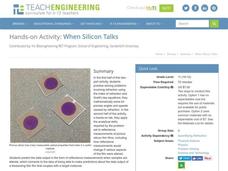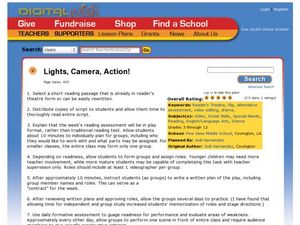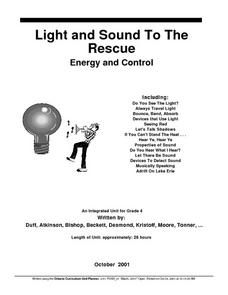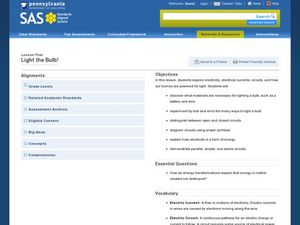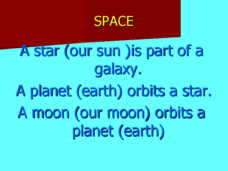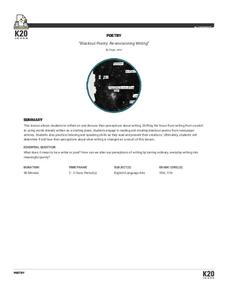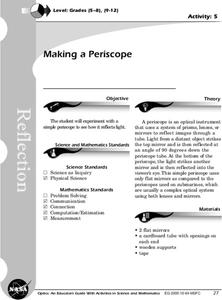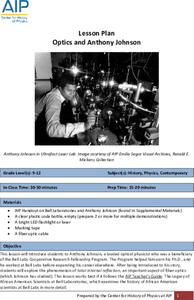American Institute of Physics
The Black Scientific Renaissance of the 1970s-90s: African American Scientists at Bell Laboratories
A two-part lesson asks young scientists to research the contributions of African American scientists at Bell Laboratories. After presenting their findings, class members watch two demonstrations that introduce them to total internal...
Teach Engineering
When Silicon Talks
Explore Snell's Law using thin films. In the fifth installment of a seven-part series, pupils solve a set of problems relating to Snell's Law and use this skill during an experiment requiring the collection of reflective measurements...
Curated OER
Spherical Mirrors
Some formatting issues will need repair (a few overlapping text boxes and pictures), but overall this is a comprehensive presentation on how light reflects off of spherical mirrors. Both convex and concave mirrors are explained,...
Curated OER
Lights, Camera, Action!
Students explore various images and recognize that in order to make a visible image using a camera or using our eye, light is required. In small groups, they observe how the eyes respond to changes in light and record their observations...
Curated OER
Light, Sound and Energy
The students will be given opportunities to work independently and in teacher-directed situations to study and discover the many facets of light and sound, and the uses of energy in our environment. The grade 4 students will learn the...
Curated OER
Light And Sound To the Rescue
Fourth graders use the design process to construct devices that send distress signals through air and water for purposes of rescue. They construct devices that use light and sound to assist in nautical rescues and use the knowledge...
Pennsylvania Department of Education
Light the Bulb!
Third graders investigate electrical circuits and how light bulbs are powered. In this electricity and power activity, 3rd graders study the vocabulary necessary which includes the different types of circuits, electrical currents, and...
Curated OER
Vision and Optics: Light and Lenses
Students gain a conceptual comprehension of the functioning of the Human Eye in relation to optics and optical vision correction. They explore optics with light sources and various lenses, relating these to visual acuity, accommodation,...
Curated OER
Basic Space
Three basic slides cover information about light years and how images of space are viewed. Some facts about light years are given and then a labeled diagram of a telescope is shown. One basic slide is included with definitions of...
Curated OER
Physical Setting: Physics Exam 2004
Twelve pages of mostly multiple-choice questions comprise this comprehensive New York Regents physics exam. It covers an entire year's worth of physics curriculum and requires about three hours for completion. Review the questions to...
K20 Learn
Blackout Poetry: Re-Envisioning Writing
Shed light on the beauty of language with a great poetry activity. After learning about Austin Kleon's blackout poetry model, pupils respond to some of his poetry and use it as a model to produce their own. Young writers also share their...
Curated OER
Making a Periscope
Students experiment with a simple periscope to see how it reflects light. They draw a diagram of the path a ray of light follows as it travels from an object, through the periscope, and into your eye.
Curated OER
Fish Tank Optics: Learning How Light Travels
Students examine light waves and see how they travel. They explain that light moves in waves, which can bounce off of or go through materials. They use a flashlight to shine on a variety of objects.
Curated OER
E3 Project Instructional Plan: Light
Eleventh graders investigate the nature of light. In this physics lesson, 11th graders determine how light intensity varies with the distance of the light source.
Curated OER
Chlorophyll And The Color Of Light
In this biology and math worksheet, students view a graph of percentage of light reflected by chlorophyll and compose answers to questions on a separate piece of paper. This worksheet would be a fine homework assignment.
Exploratorium
Touch the Spring
Concave mirrors and the images they produce are traditional topics in the physics classroom. This resource explains how to set up an investigation of them, and it provides you with the explanation of concepts.
CK-12 Foundation
Cassegrain Telescope
How does a telescope magnify images? Learners first watch a tutorial explaining the basic construction of a telescope. Then they interact with a simulation that allows for changes in the location and diameter of the reflecting mirrors....
American Institute of Physics
Optics and Anthony Johnson
Message sending has come a long way since the days of Morse code's dots and dashes. Young scientists study the research of optical physicist Anthony Johnson and his work in fiber optics, lasers, and the principle of total internal...
Exploratorium
Bird in the Cage
When your life science class is learning about the eye and how it works, you can add this activity as a demonstration of how the retina holds an afterimage. After staring at a red, green, or blue bird shape, pupils glance at a cage and...
University of Colorado
Marvelous Martian Mineralogy
All you need is light. Groups use a reflectometer to find the reflectivity of specific chemical compounds. Learners compare the graphs of the reflectivity of the known compounds to Martian soil. Using the graph comparisons, scholars...
Museum of Tolerance
Music Evokes Memories and Emotions
Dim the lights, take a deep breath, and press play to explore the emotions and memories that music elicits. Class members begin using relaxation techniques designed to create a positive listening experience. As music plays, learners...
PBS
Thomas Edison: Inventor and Entrepreneur
How many of Thomas Edison's inventions do your scholars use every day? They might be shocked to find out! Young historians watch a video, analyze a photograph, and read one of Edison's letters to learn more about his life and impact....
Curated OER
Too Bright at Night?
Students reflect upon the causes and effects of light pollution in the night skies. First, they read articles provided and then do worksheets that are provided. They work in groups to discuss their conclusions.
Curated OER
Urban Heat Islands: An Introduction to Energy Transfer and Transformation
Elementary school physical scientists explore kinetic mechanical energy by dropping a golf ball on different surfaces. They discuss how human made materials might react to light differently from nature made materials. This lesson plan...



